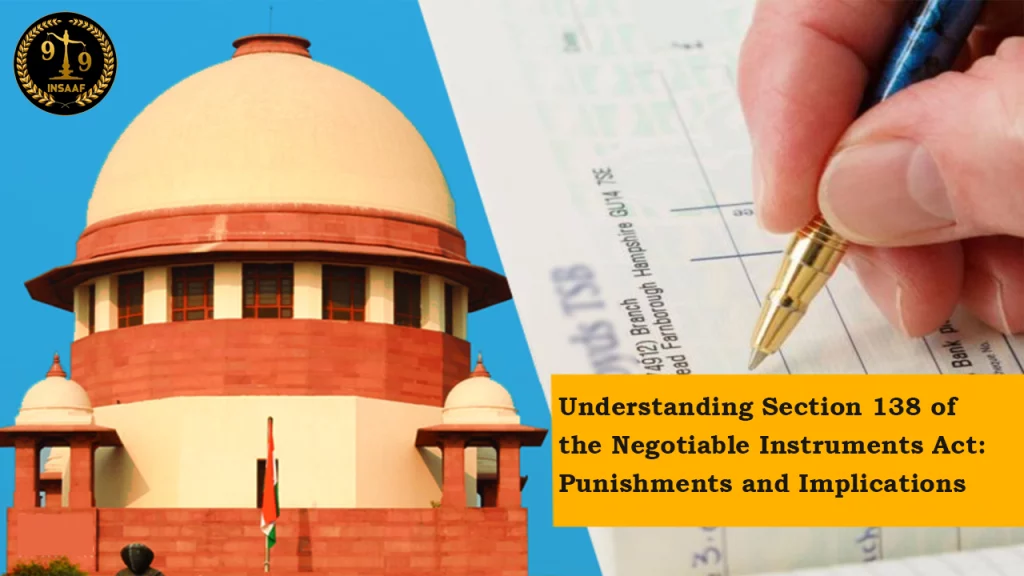

Online Legal Advice from Insaaf99® Online Lawyer Consultation in India


Online Legal Advice from Insaaf99® Online Lawyer Consultation in India

Section 138 of Negotiable Instrument Act, 1881, is a pivotal provision in India's legal framework. It addresses the dishonor of cheques, maintaining trust in negotiable instruments like cheques. According to this provision, issuing a cheque to settle a debt, fully or partially, with knowledge of insufficient funds to cover it constitutes an offense. If the cheque is dishonored, the offender may face imprisonment up to two years, a fine up to twice the cheque amount, or both. This legal safeguard ensures the credibility of cheques and offers a legal remedy for those affected by dishonored cheques, preserving the integrity of financial transactions in the country.
Negotiable instruments, like cheques, are essential in the Indian financial system. They empower financial inclusivity, bridge the urban-rural divide, and foster accountability and transparency. These instruments also adapt to the digital era, facilitating secure transactions. Their trusted nature supports economic growth, making them a cornerstone of the Indian financial ecosystem, connecting diverse segments of the population and underpinning commerce and trade.
Section 138 of the Negotiable Instruments Act focuses on the dishonor of cheques and outlines the repercussions that the drawer may encounter in such cases. It offers a well-defined framework for addressing this matter and aims to maintain the credibility of negotiable instruments, particularly cheques, ensuring that individuals and businesses can have faith in their reliability. Let's delve into the key aspects of this section
Cheque Dishonor: Section 138 is invoked when a cheque is dishonored, often due to insufficient funds in the drawer's account or technical issues like a signature mismatch.
Notice of Dishonor: In the event of a dishonored cheque, the payee is required to send a notice to the drawer within 30 days of being informed of the dishonor. This notice demands the payment of the cheque amount.
Drawer's Obligation: Upon receiving the notice of dishonor, the drawer must make the payment within 15 days. Failure to comply with this obligation exposes the drawer to the legal consequences outlined in Section 138.
Also Read: - Supreme Court Judgments on Money Recovery Suit: Protecting Your Financial Interests
Imprisonment: The drawer may be subject to imprisonment, with a maximum term of up to two years. It's important to emphasize that the court retains discretion in determining whether imprisonment is warranted.
Fine: Alongside or in place of imprisonment, the court can levy a fine on the drawer. This fine may be as much as double the value of the dishonored cheque.
Compensation: The drawer is additionally obligated to compensate the payee, with the compensation amount not exceeding the value of the dishonored cheque.
To establish an offense under Section 138 of the Act, the prosecution is required to demonstrate the following:

Section 138 of the Negotiable Instrument Act carries substantial implications and significance:
Upholding Cheque Credibility: Section 138 reinforces the credibility of cheques as a trustworthy method of payment by discouraging the issuance of cheques without adequate funds or with fraudulent intentions.
Legal Recourse: This section establishes a legal avenue for creditors to seek redress when faced with a dishonored cheque. It safeguards the interests of individuals and businesses, assuring that negotiable instruments can be depended upon without concerns about non-payment.
Deterrence: The provision of imprisonment and fines serves as a potent deterrent, dissuading the issuance of cheques without ensuring the availability of sufficient funds.
Fairness in Financial Transactions: Section 138 strikes a balance between the rights of the creditor and the obligations of the debtor, ensuring fairness for both parties engaged in financial transactions.
Section 138 of the Negotiable Instrument Act stands as a pivotal provision, serving as the bedrock of integrity for negotiable instruments like cheques. It not only provides a legal means for creditors to reclaim their dues but also acts as a formidable deterrent against unscrupulous financial practices. Understanding the implications and penalties outlined in this section is essential for individuals and businesses, ensuring that financial transactions are conducted with transparency and reliability.
Insaaf99, an online legal consultation platform, plays a pivotal role in aiding individuals and businesses facing issues related to Section 138 of the Negotiable Instrument Act. By providing easy access to legal experts and advice, Insaaf99 ensures that clients receive guidance on handling dishonored cheques, adhering to legal obligations, and understanding the implications of Section 138. This valuable resource empowers users to navigate the complexities of the Act, promoting compliance, fairness, and the swift resolution of financial disputes.